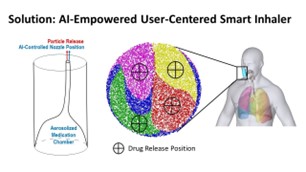Background
Managing pulmonary diseases such as asthma, chronic obstructive pulmonary disease, and cystic fibrosis presents considerable challenges, particularly in achieving directed drug delivery to the lungs at the necessary doses. The primary approach for both long-term treatment and rescue drug delivery involves the use of inhaler devices, wherein the patient forcibly inhales an aerosolized drug dose. Traditional inhalers have inefficient medication distribution and delivery, which keeps drugs from reaching the necessary locations in the lungs, as well as wasted dosages. These shortcomings lead to suboptimal treatment and potential side effects, necessitating higher dosages to achieve the clinical impact, and highlighting a critical need to improve inhaler performance.
Summary of Technology
Researchers at OSU have developed a novel smart inhaler dubbed PulmoPrecise to address these issues. Pulmoprecise is a state-of-the-art smart inhaler using fluid-flow informed Computational Fluid Particle Dynamics (CFPD) and Machine Learning (ML) optimization classified under Artificial Intelligence (AI) to alter inhalation therapy by supporting highly personalized and precise drug delivery to targeted lung sites. This innovative technology represents a much-needed advancement in pulmonary healthcare, which proposes targeted drug delivery systems to achieve high efficiency in directing medication to specific pulmonary sites, which enhances therapeutic outcomes while minimizing exposure to healthy lung tissue. Additionally, adaptive AI algorithms can adjust drug administration strategy based on real-time patient needs, making the technology applicable across various lung diseases and significantly reducing wasted doses. Finally, advanced modeling techniques, supported by CFPD and ML, ensure precision and efficacy in treatment delivery. These medical conditions, which require pursued therapy, will benefit from the enhanced precision and efficiency offered by PulmoPrecise.
PulmoPrecise stands out as a cutting-edge solution constructed to revolutionize inhalation therapy with its precise and personalized approach to drug delivery, drastically increasing the efficacy of currently known drug therapies to create better health outcomes for patients.

Potential Areas for Application
- Treatment of pulmonary diseases dependent on inhaler-based drug delivery
- Modelling for pulmonary clinical research
Main Advantages
- Reduce overall treatment expenses.
- Achieve exceptional delivery efficiency for optimal outcomes
- Empower effective treatment strategies with valuable insights
- Ensure patient information confidentiality with advanced protection
Stage of Development
Proof-of-Concept